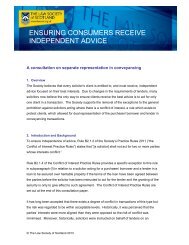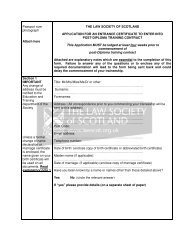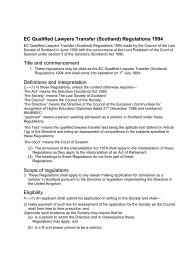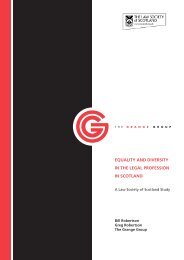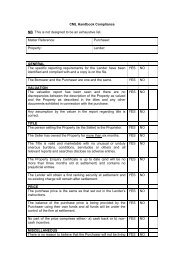October 2010 - Law Society of Scotland
October 2010 - Law Society of Scotland
October 2010 - Law Society of Scotland
Create successful ePaper yourself
Turn your PDF publications into a flip-book with our unique Google optimized e-Paper software.
26 Drumsheugh Gardens<br />
Edinburgh EH3 7YR<br />
Legal Post LPI Edinburgh -1<br />
T: 0131 226 7411<br />
F: 0131 225 2934<br />
Textphone: 0131 476 8359<br />
The result <strong>of</strong> this is that the directors cannot sell any goods subject to a<br />
retention <strong>of</strong> title agreement without the approval <strong>of</strong> either the creditor or the<br />
court. Retention <strong>of</strong> title agreements are now so commonplace that there can be<br />
few businesses where most <strong>of</strong> their stock is not covered by a retention <strong>of</strong> title<br />
agreement and trading would be very difficult/impossible in practice as no<br />
creditor would agree to the goods being sold without their being paid and<br />
paragraph 20(6) provides that the net proceeds <strong>of</strong> such sale shall be applied to<br />
discharging the sums payable under the hire-purchase agreement.<br />
Even in a business <strong>of</strong> little complexity it would be difficult for directors to put a<br />
system in place to deal with this and any Monitor appointed in respect <strong>of</strong> the<br />
Moratorium would be concerned that he is being asked to confirm that the<br />
directors are dealing with this properly.<br />
Unless this issue is addressed, the consultation and any legislation which may<br />
flow from it will be a waste <strong>of</strong> time, cost and effort.<br />
In addition to the above there are some peculiarities in Scots <strong>Law</strong> which need<br />
to be addressed. They are as follows:<br />
1. The Insolvency Act 1986 Sch B1 moratorium refers specifically in para<br />
43(5) to irritancy (as the Scottish equivalent to forfeiture <strong>of</strong> leases) where<br />
the Sch.A1 version mentioned in the paper does not. This will need<br />
changed in any legislation to ensure irritancy is also precluded.<br />
2. The reference in para 4.21 <strong>of</strong> the paper to altering the "onset <strong>of</strong><br />
insolvency" for the purposes <strong>of</strong> the challenge <strong>of</strong> prior transactions<br />
doesn't work for the Scottish provisions in sections 242 & 243 <strong>of</strong> the<br />
Insolvency Act 1986 as they are formulated in a different way. The<br />
Scottish common law provisions probably do not require to be altered as<br />
they have no time limits anyway.<br />
3. The adjusted cut-<strong>of</strong>f date for set-<strong>of</strong>f referred to in para 4.25 will need to<br />
be looked at specifically for <strong>Scotland</strong> as Scottish insolvency set-<strong>of</strong>f<br />
operates in a different way from English insolvency set-<strong>of</strong>f. It is not<br />
governed by the Scottish insolvency rules but rather by a combination <strong>of</strong><br />
general set-<strong>of</strong>f rules under the 1592 Compensation Act and the common<br />
law, adjusted by common law principles in their application in insolvency.



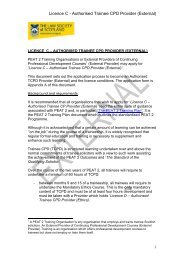
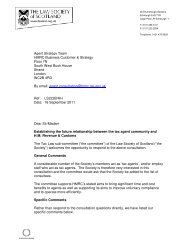
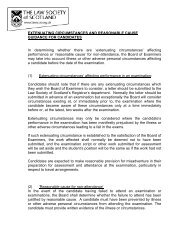
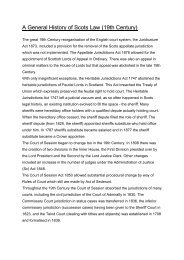
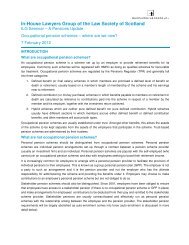
![BMA Consent form[1]. - Law Society of Scotland](https://img.yumpu.com/48530616/1/184x260/bma-consent-form1-law-society-of-scotland.jpg?quality=85)
